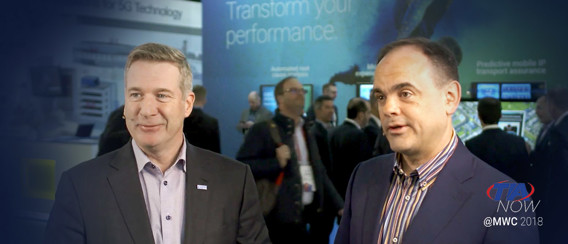NFV: it takes a village
During Mobile World Congress, Clarence Reynolds, TIA Now’s Anchor and Editorial Director met with Matt Beal, Director, Technology Strategy & Architecture for Vodafone and Philippe Morin, EXFO’s CEO to discuss how NFV is radically changing the way we both design and use networks.
Bringing NFV from the conceptual stage to a functional reality is a challenging undertaking. Mr. Reynolds inquired about the drivers behind Vodafone’s network transformation initiatives. According to Mr. Beal, technology has never moved faster, while simultaneously, Vodafone customers (as all subscribers do) want instant access to services. Since the rate of technological change is still accelerating, Vodafone is putting technologies and platforms in place now to be as agile as possible in addressing changing customer needs as they continue to evolve. The challenge is that making this move a success involves creating a very responsive and virtual cloud of services.
Philippe Morin noted that adding automation into the mix is essential to this transformation and having the best service assurance and monitoring solutions in place—to ensure that quality of experience is optimal—are critical to success. “Customers must be getting the right experience at the right place with the right device and that's what is really a challenge,” said Mr. Morin. “For us, it's all about this notion of moving from hardware to the cloud and software,” added Mr. Beal. “We talk about virtualization but in reality it's actually making a cloud—a very responsive and all digital cloud—of our service. The mindset shifts that go with that are actually the hardest ones, and actually making this change and finding the insertion points—when do you do this for your customers so that it actually helps them.”
How does automation help address the challenges of virtualization
Mr. Morin noted that as SDN, NFN and virtualization become more fluid and operational in nature—for example scaling networks both up and down using network splicing capabilities—all the right tools must be in place. Mr. Beal discussed that automation doesn’t just make things easier, in a fully cloud-based environment, it is essential. He added that with respect to the structure of the new network environment, “We have to put it in place with the degree of discipline and care to be able to scale and move as quickly as we need to—actually it's a real challenge to get these things right—but that's what it's all about.” Both men agreed that scalability in real-time was especially important with Mr. Beal stressing, “It's not been our business in the past to be there within a click or faster and that's what we need to do now and that's where the automation has to come into place.”
What’s next for Vodafone in the transformation to 5G?
“We think less about 5G and just more about this overall transformation,” shared Mr. Beal. His customers are well on their way forward through what he refers to as their “digital journey” and so Vodafone is moving their 4G networks and fixed infrastructure systems forward to react in real-time now, not waiting for the reality of 5G to arrive before enacting that transformation. “It's much more important that we get this right now because then 5G can actually happen. If we don't do this, then we’ll raise barriers to actually being successful when that eventuality takes place.”
What’s next for EXFO?
“At EXFO our strength has been mainly on the fiber side and the optical side and we're leveraging all of that strength in this fiber modernization cycle that's happening right now.” However, Mr. Morin goes on to explain that the next cycle of growth will be on the wireless side of the network. Astellia, a company strong in the mobility and wireless space, is EXFO’s most recent corporate acquisition adding service assurance and monitoring capability for 4G, LTE and, overtime, 5G deployments to EXFO’s product and solution portfolio. Acquiring Ontology has helped EXFO strengthen its knowledge and offerings in terms of network topology. Mr. Morin explains that EXFO’s acquisition of these two companies furthers its strategy to gain the knowledge and expertise necessary to make EXFO a stronger player in the industry.




